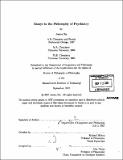| dc.contributor.advisor | Richard Holton. | en_US |
| dc.contributor.author | Sin, Jessica M., 1975- | en_US |
| dc.contributor.other | Massachusetts Institute of Technology. Dept. of Linguistics and Philosophy. | en_US |
| dc.date.accessioned | 2008-05-19T16:09:30Z | |
| dc.date.available | 2008-05-19T16:09:30Z | |
| dc.date.copyright | 2007 | en_US |
| dc.date.issued | 2007 | en_US |
| dc.identifier.uri | http://hdl.handle.net/1721.1/41696 | |
| dc.description | Thesis (Ph. D.)--Massachusetts Institute of Technology, Dept. of Linguistics and Philosophy, 2007. | en_US |
| dc.description | Includes bibliographical references (p. 83-88). | en_US |
| dc.description.abstract | This dissertation consists of three chapters in which I address metaphysical and epistemological issues that arise in psychiatry, with particular attention paid to anti-psychiatric concerns. In Chapter 1, I consider three versions of anti-realism about psychiatric illness. I argue that Szasz's version of anti-realism should be rejected because it rests on a misunderstanding of illnesses more generally. Although I do not offer any clear refutations of labeling theory or cultural relativism, I point out the serious disadvantages of holding either view. I argue that in the absence of compelling reasons to endorse either labeling theory or cultural relativism, we are within our rights to remain realists about psychiatric illness. In Chapter 2, I address an epistemological concern that the scientific legitimacy of psychiatric taxonomy is compromised by the role that value judgments play in the study of mental disorders. I claim that this worry presupposes a view of science according to which objective observation and theory construction would not even be possible. I argue that, on a revised understanding of science proposed by Helen Longino, a scientifically legitimate psychiatric taxonomy is within our reach. Finally, in Chapter 3, I turn to the metaphysical problem of providing an account of disorders. An important part of a realist view of mental disorders includes an account of disorders. I claim that in light of available evidence of the heterogeneity of disorders, it is unlikely that disorders share an essence, and I argue that previous attempts to provide a Lockean account of disorders fail for this reason. I propose instead that disorders are homeostatic property cluster kinds of the sort first described by Richard Boyd. | en_US |
| dc.description.statementofresponsibility | by Jessica Sin. | en_US |
| dc.format.extent | 88 p. | en_US |
| dc.language.iso | eng | en_US |
| dc.publisher | Massachusetts Institute of Technology | en_US |
| dc.rights | M.I.T. theses are protected by
copyright. They may be viewed from this source for any purpose, but
reproduction or distribution in any format is prohibited without written
permission. See provided URL for inquiries about permission. | en_US |
| dc.rights.uri | http://dspace.mit.edu/handle/1721.1/7582 | en_US |
| dc.subject | Linguistics and Philosophy. | en_US |
| dc.title | Essays in the philosophy of psychiatry | en_US |
| dc.type | Thesis | en_US |
| dc.description.degree | Ph.D. | en_US |
| dc.contributor.department | Massachusetts Institute of Technology. Department of Linguistics and Philosophy | |
| dc.identifier.oclc | 221287259 | en_US |
